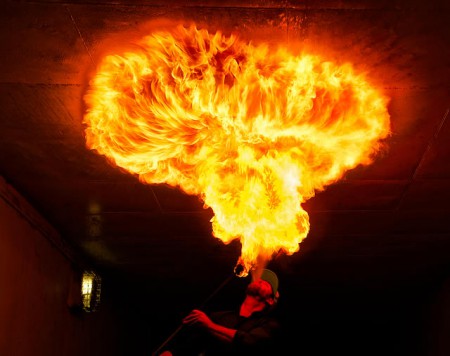Trump’s election helps The UMC understand the Wesleyan Covenant Association’s base of support and potential for disruption of the institution.
Trump-sized Reveal
The November 2016 election of Donald Trump as President-Elect of the United States has turned a spotlight onto the voting power and plight of Rust Belt and Bible Belt Americans who are discontent with the way things are and who voted for seismic change.
Interesting, the United Methodist Church draws its largest percentage of American membership from this same region of the country. This begs the question: Are similar sentiments simmering in United Methodism?
I believe there are, and they are particularly attracted to one caucus group that is strategically placed to drive the Church to either schism or expulsion of differing points of view.
![By Andrewrabbott (Own work) [CC BY-SA 4.0], via Wikimedia Commons](https://aws.hackingchristianity.net/wp-content/files/john-wesley-stainedglass-cc-wikimedia-450x390.jpg)
Wesleyan Covenant Association
I have previously noted the many ways the year-old Wesleyan Covenant Association mirrors negative parts of American culture (1, 2, 3). But it seems I’ve been circling around the crux of the matter, as it took Trump’s election for me to finally put it all together.
United Methodist News Service recently featured WCA Council member Dr. Bill Arnold in its daily digest. Dr. Arnold indicates that the WCA is necessary to preserve the founding spirit and doctrine of Wesley’s vision for Methodism.
I do not doubt the sincerity of Dr. Arnold’s writings. However, the cultural forces at play have little to do with high-minded preservation of theological treatises and much to do with the same forces that propelled Trump past preservation-minded opponents to the highest seat in the land.
01: the system failed them
In the Rust and Bible Belts, one persistent narrative is that America failed them. Their way of life is disappearing–no longer are towns built around one manufacturing company, no longer can families be supported by one working-class salary. Young people have left Middle America for the coasts. The “American Dream” has revealed itself to be what it always was for most Americans: a myth.
Some parts of United Methodism believe our church system has failed them as well:
- Clergy who were told that they could rise through the ranks to big-steeple churches have been passed over for whipper-snappers younger than some of their clerical robes.
- Laity were told that Methodists believe the same always and everywhere (which, too, is and always has been a myth).
- The charge is that the general agencies advocate for the best of Methodism, but when they take positions that individual Methodists disagree with, then there’s allegations of betrayal.
There’s a lot of disparaging of the institutions that have failed them. But it gets even more specific than discontent.

02. start it all over
The #1 refrain of my friends and acquaintances who voted for Trump is “I wanted change,” ranging from “he will make outsider decisions” to “he will burn it down and start over.”
Likewise, the WCA’s promised future is a return to (their version of) the early days of Wesleyanism, a day when institutions like diverse seminaries and general agencies are no more.
The Rev. Ryan Barnett, a Texas pastor, spoke at WCA’s inaugural event about a Wesleyan movement without General Boards and Agencies, set free from top-heavy bureaucracy leading agencies into areas WCA leaders loathe funding–mainly areas of mission. He dreamed of all the money that currently goes to general boards and agencies (the whopping pennies on the dollar), going instead to Africa, no doubt being used more on conversion and evangelism than on mutuality in mission.
While lip service is given to continuing to pay apportionments and support Methodist missions and ministry, the stated goal is to not have to pay any more and let those institutions crumble.

03: a channeled anger
Anger has been a documented phenomenon in a country that has abandoned the manufacturing infrastructure in the Rust Belt, and Trump has often been accused of whipping up anger through his late-night tweets and rhetoric.
The WCA has a hazy relationship with institutional anger. Rev. Rob Renfroe at the inaugural event said that anger is not the driving issue of the WCA. From an observer’s record:
“[The WCA] will not be a group of people who are mad at the church, angry at progressives, and belligerent to the culture. Is there much to be upset about? Yes, there is: Pastors who teach contrary doctrines that promote pluralism … annual conferences unwilling to live by the covenant … bishops who provoke disobedience …” – Rev. Rob Renfroe
The rhetoric from their strongest supporters tells a different story. One has only to wander into 3,300 member United Methodists for Truth to see the vitriol poured out against progressives and LGBTQ Methodists day after day. And for years, the perceived failures of the system were collected on sites like UMBishopWatch and UCM Page that shared private emails (which Good News is now doing, too) and fevered accusations.
You can’t claim to be a responsible peaceful opposition with such resentment and tactics. In the same speech as quoted above, Renfroe said the aforementioned reform groups would stay “on defense” while the WCA would go “on offense.” Troubling. The relationship WCA has with its angry supporters (much like Trump’s hazy relationship with his base) bears future scrutiny.

04: demographics parallel
Finally–and this is important–the American electorate that supported Trump are curiously similar to the demographics of the WCA.
Trump’s key supporters that put him over the top in key Rust Belt states were white men. At the WCA inaugural event, roughly 95% of participants were white, and 85% were male, per three uncorroborated observer reports (WCA hasn’t publicly released demographic data). And at the top, more than half of the elected leadership has connections to Asbury Theological Seminary in the heart of the Rust Belt.
Here’s the key: It’s to this group especially–white, male, Christian–that the American Dream was promised, and the church with it. Perhaps the fear of losing it, even if never truly possessed it, is what drives the WCA’s critical stance of exclusion of LGBTQ Christians.
An Unsteady Horizon
Denominations exist to express an aspect of the Gospel that, but for that denomination, would diminish or cease to exist. — John C. Dorhauer
The United Methodist Church matters in the world, and we should be worried at its future.
The same Western cultural forces that voted against the institutions and nation states (Brexit and Trump) are ready to do the same to United Methodism. Many of the cultural tendencies and appropriations that propelled Trump into office are driving the Wesleyan Covenant Association, which is best placed to put decades of anti-institutional ire into final action.
The dream envisioned by the WCA–the Church either of the 1950s or the 1770s, depending on the speech–was a church that thrived when women and minorities were kept separate. That’s not the church of the future, if the only way forward is “back” to applying the same sentiment to today’s vulnerable minorities in church and world.
Contrary to Dr. Arnold’s article, that doesn’t make the WCA necessary to retain theology and doctrine; rather, it makes it a threat to every advancement made in including more people in the ever-widening circle of God’s love.
Unity with Diversity beyond American Culture
My hope for The Church lies in our global polity. Forty-two percent of the votes to get anything through General Conference come from outside of the United States’ reactionary cultural context. Large swaths of Methodism in Africa and the Philippines are not part of this cultural itch to tear down institutions. Indeed, Global Ministries, UMCOR, and increased theological education, (ie. the institutional church) have been good to these parts of the world.
While the majority of central conferences seem to support the continued exclusion of LGBTQ people, the cultural tear-down forces are not as present and reasonable compromise is possible, unlike with the WCA. As Dr. Maria Dixon Hall shared about her GC2016 and following summer experiences (and my response here):
“One African delegate said to me, ‘Maria, we will not let this issue [homosexuality] destroy the connection of the Church—it is that connection that is most sacred.’”
My hope lies in the global church (and the Bishop’s Commission) that they find a balance of Unity (in doctrine and teaching) with Diversity (in non-orthodox topics like LGBTQ value). I believe this has a higher virtue than the status quo, and such unity-in-diversity is how the Global South operates anyway.
The church grows together when loud factions cannot take the church hostage, and the well-respected people on the Bishop’s Commission combined with the increasingly diverse Global South will hopefully grow into that counterweight to the culture-driven tear-down drive-out forces of the WCA.
At least, today, that’s my hope. What’s yours?
Your Turn
Fear and mistrust that God created enough for all, spread about in echo-chambers of frustrated white men, make the Wesleyan Covenant Association a well-funded threat to the big global tent of Methodism, and we should pay close attention to their actions and words in the coming months.
Thoughts?
Thanks for reading, and your shares of this document on social media. The conversations they inspire are appreciated and necessary.





Just a perspective – I don’t see Asbury seminary as being in the heart of the rust belt. From my Ohio point of view, I see it as desiring to be the anchor institution for evangelicalism, which is made more possible by being in the southeast jurisdiction, though it has graduates all over the southeast and midwest, mainly because it has billed itself as THE wesleyan alternative to our official seminaries.
Demographically, do Kentuckians consider themselves to be in the Rust Belt? (I honestly don’t know. I don’t see Kentucky that way).
Beyond that esoteric point, I think you’ve made a credible analysis here. I continue to question whether it will be possible for there to be a unifying structure with a diversity of belief and practice on the critical issues of the day.
Sorry most of that first paragraph turned into a run-on sentence – hopefully you will find my meaning in it. That’s what I get for posting on the fly!
I’m open to being wrong about whether they consider themselves to be Rust or Bible belt, sure. I’m familiar with the Texas/Oklahoma western end of the Belt but less the middle of it.
I’d put the squarely in the appalachians, Trump’s best region. People talk about the rust belt because their choice swung the election. But Appalachia gave him the best margins. And evangelical Christian constitute Trump’s base. So yes, evangelicals in the church are the engine of the WCA and supporters of Trump. Trump is not Christian nor are his policies. One has to ask what they see in him, if not for his anti-institutionalism and authoritarian leadership.
Are evangelicals the engine of the WCA? Without a doubt. Supporters of Trump? For some, yes, but for many, more likely highly opposed to Clinton, particularly for her uncompromising stance on abortion, which they perceived to be equally un-Christian. Remember, both candidates’ negative numbers were stratospheric right into Election Day. Most evangelical voters held their noses walking into the voting booths because, for them, both candidates stunk but they had to discern which one had the least decay.
Parts of KY would be considered Appalachia, other parts urban (Louisville-Lexington), still other parts rural/agricultural, and where I live (Purchase Area) is considered Delta culture. So with the exception of the Louisville-Cincinnati corridor, I doubt you could label KY Rust Belt.
The Bible Belt has pretty much rotted of the waist of the South. While we UM church folks think of other church folks as more progressive/liberal/orthodox/whatever than us, the reality is that most people
in the South aren’t Christian Evangelicals. Their grandparents probably were, and their parents MIGHT have been, but they aren’t, and their children certainly aren’t. They don’t attend church, fewer than 50% even consider themselves “spiritual but not religious,” and they tend not to trust an institutional church, government, union, organizations, etc. So while we who are in the UMC think highly about all of our issues, it’s become clear that the vast, wide, and deep mission field around us doesn’t give a rat’s tail about our denominational infighting, much less where we as individuals or local
churches align ourselves. They just know we aren’t trustworthy and we’re at best indifferent about them and their lives. That’s how they felt about this election.
The vast majority of people in the pews of UMC’s in the Southeast haven’t heard (much less care about) WCA or any other affinity group. Our “big global tent” Methodism is as irrelevant to them as political affiliation. Doing Third Place/Fresh Expressions ministry has taught me a lot, and the things we church folks fight and fuss about have no bearing on the vast majority of works. It’s not even news worthy.
“…shared private emails (which Good News is now doing, too) and fevered accusations.”
Broken Link.
Thanks for your work.
Jason
Yes, this post was began weeks ago and, between that time and now, Good News removed it after vigorous debate with the author of the email. I went ahead and retained it to remind them that we noticed their error and they should stick to better journalistic practices. Sorry to disappoint you.
What Trump’s Election reveals about the Wesleyan Covenant Association? Even if this question could be answered with valid rational research, I don’t believe it would reveal much. To posit it as way to understand the WCA and then offer biased baseless assumptions is not helpful in the least.
Won’t Progressive Methodists be glad when the “WCA” Methodists just leave and let Progressives run their church in peace? Isn’t that inevitable?
Otherwise, you will never have unity and never change church law (i.e. The Discipline) on homosexual practice being “incompatible with Christian teaching”. Africa gives WCA types a perpetual majority.
I think you should look into the IRD and their connections with the same big money that supported Trump. I also see a troubling prevalence of Anglicans in the members of WCA. These seem to be associated with male dominated groups.